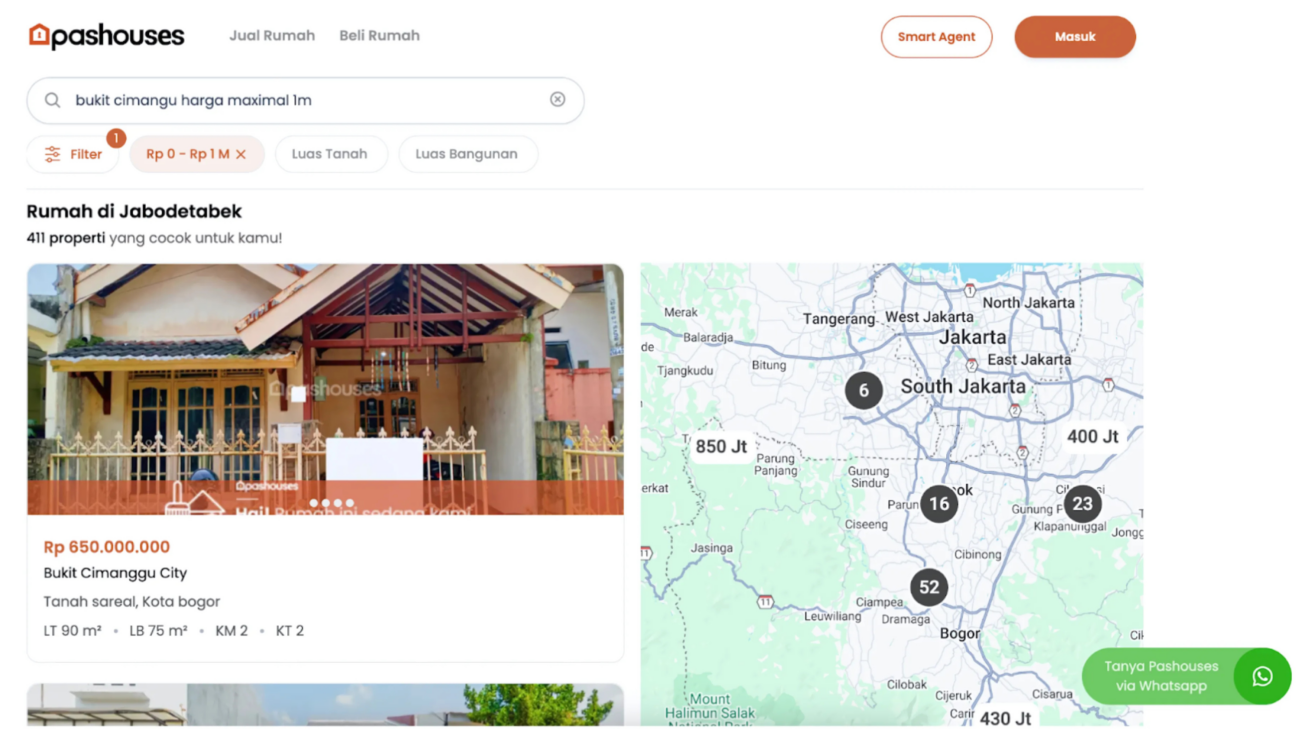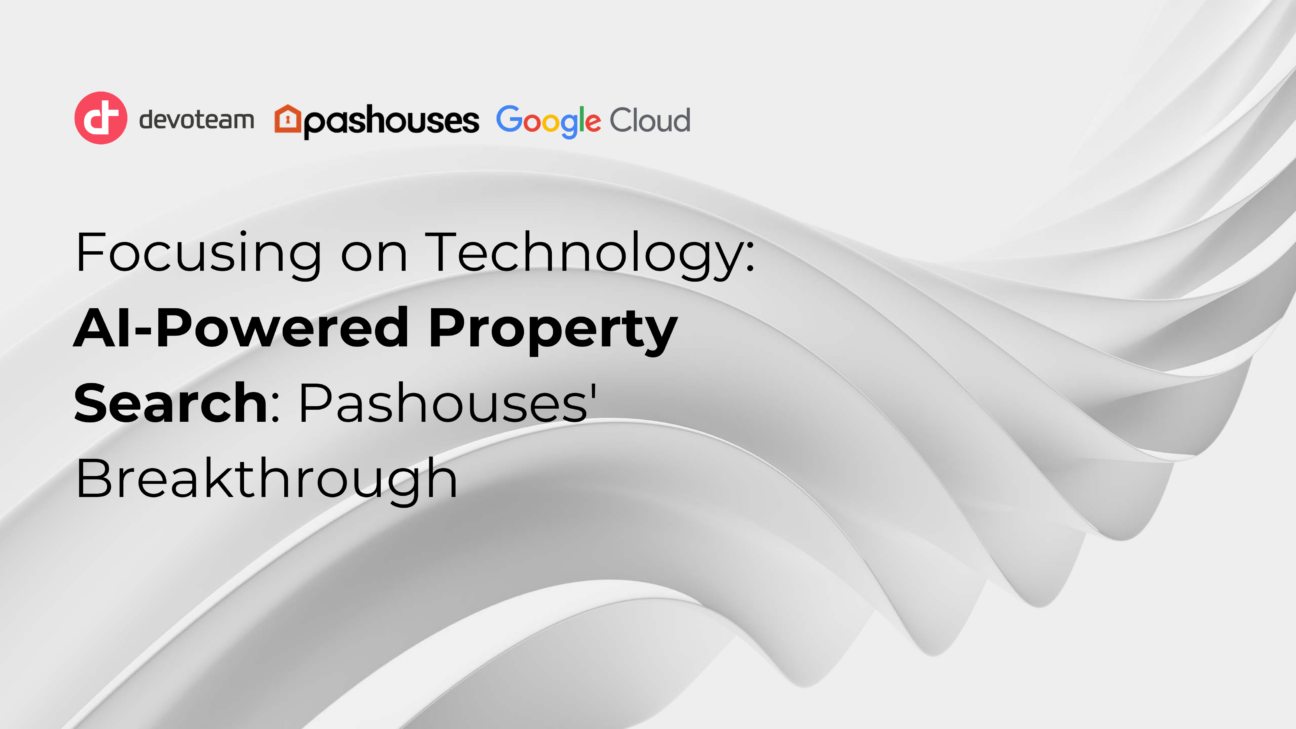Devoteam role likely encompassed the technical aspects of developing, deploying, and maintaining the semantic search prototype on Google Cloud. Their expertise in machine learning, cloud infrastructure, and API development would have been crucial in delivering a successful solution that improved user experience and drove sales for Pashouses.
About Customer
Pashouses.id is an Indonesian real estate platform specialising in the buying and selling of existing homes. Launched in 2021, it operates as an end-to-end transactional marketplace, aiming to simplify and expedite property transactions. Pashouses focuses on the secondary market for ready-to-occupy homes, catering to a specific market segment with defined financial capabilities.

The Challenges
Pashouses’ initial search engine presented several significant hurdles that negatively impacted user experience and potentially limited sales. The first major issue was poor typo tolerance. Users frequently make typing errors, and the existing search often fails to deliver accurate results or returns no results at all in these instances. This led to the user frustration and could cause potential buyers to abandon their property search altogether.
Beyond simple typos, the original search engine also suffered from a limited understanding of user intent. Often, users might not know the exact keywords or property names used in listings. For example, a user searching for a “house with a garden” might miss relevant properties described as having a “yard” or “landscaped area.” This semantic gap between user queries and listing descriptions resulted in missed opportunities for both buyers and sellers.
Finally, the rigid nature of the keyword-based search engine further compounded these issues. The search required precise wording, offering little flexibility in terms of natural language or variations in phrasing. This forced users to constantly refine and rephrase their searches, adding unnecessary complexity to the process and hindering the exploration of available properties. This rigidity ultimately made the platform less user-friendly and potentially drove users to competitor sites.

The Solutions
To overcome these challenges and provide a more effective search experience, a semantic search prototype was developed using Google Cloud’s Vertex AI. This approach leverages the power of vector embeddings and machine learning to understand the meaning and context behind user queries, moving beyond simple keyword matching.
The solution implemented with Vertex AI focuses on three core improvements. First, it embraces the power of meaning. By analysing the semantics of user queries, the search engine can understand the underlying intent, recognising that “house with a garden,” “home with a yard,” and “property with landscaped grounds” are essentially the same request. This significantly improves the accuracy and relevance of search results.
Second, the semantic search solution unlocks user intent. By understanding the meaning behind the search, the engine can effectively connect users with the most relevant properties, even if the listing descriptions don’t contain the exact keywords used in the query. This solution closes the semantic gap and ensures users discover properties that genuinely match their needs and preferences.
Third, this new approach simplifies development and maintenance. The AI models handle variations, misspellings, and synonyms automatically, eliminating the need for developers to manually map these variations. This not only saves significant time and resources but also allows the search functionality to scale more effectively as the platform grows and the number of listings increases. The prototype utilises several key components of Vertex AI, including Retail Search and Browse for enhanced search functionality, Recommendations for personalised suggestions, and Vision API Product Search for image-based queries.

In the search bar, we find not just answers, but the blueprints for the future.
The Results
The implemented semantic search prototype demonstrably improves search accuracy and provides a significantly more intuitive and user-friendly experience. The results page now displays properties that genuinely align with the user’s intent, even accounting for variations in phrasing and potential spelling errors. Testing confirmed the effectiveness of the new search functionality. For example, a search for “bukit cimangu harga maximal 1m” (Bukit Cimanggu with a maximum price of 1 billion) returned relevant results, demonstrating the ability to handle location-based searches, price filtering, and potential typos in location names simultaneously. The prototype also incorporated additional filtering options for price, land area, and building area, further enhancing the search process and allowing users to refine their results with greater precision.
Beyond specific test cases, the overall impact of the semantic search implementation is a more user-centric and efficient property discovery process. By understanding the meaning behind user queries and intelligently handling variations in language, the improved search empowers users to find the properties they’re looking for quickly and easily. While precise quantitative data is not yet available, the qualitative improvements observed suggest that the semantic search prototype will lead to increased user satisfaction, a more engaging platform experience, and potentially higher conversion rates, ultimately contributing to Pashouses’ success in the competitive Indonesian real estate market.

At Pashouses, we are always pushing the boundary of property technology, Vertex AI’s Semantic Search was exactly what we needed to improve the buyers’ experience in finding their dream home.

Want to scale your business like Pashouses?
